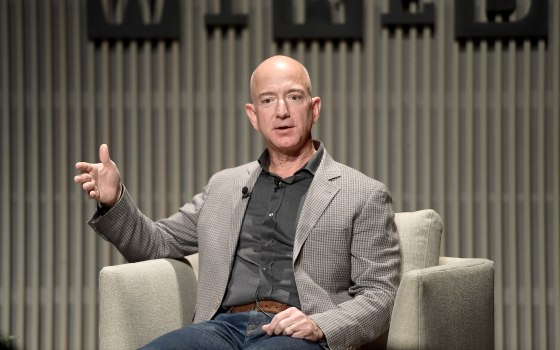Jeff Bezos, the world’s richest man, announced via a Medium post on Thursday evening that pictures of his penis were obtained by the National Enquirer.
Few of us would spare any sympathy for someone who sent unsolicited pictures of their genitals across the internet and found them, so to speak, publicly exposed. But for many people flirting online, or even in long-term relationships, exchanging the occasional adult photo is good, harmless fun. The world could, perhaps, be divided into two groups: The shrinking minority of those shocked that anyone would send an adult pic, and the broad majority of those shocked that anyone wouldn’t (including members of Congress from both parties, high-profile athletes and any number of actors).
Perhaps more startling, then, than that a recently-divorcing billionaire who was apparently having an affair would have taken explicit photographs for his paramour was an alleged email exchange, published with Bezos’ post, that purports to show an editor at the Enquirer detailing a series of intimate photos allegedly sent between Bezos that woman, and suggests that, if the billionaire told the Washington Post and a private investigator to drop the inquiries into matters involving the Enquirer and Trump, they need not be published.
The tactic appears to have backfired about as spectacularly as anyone could imagine: Bezos decided instead to make the fight as public as it could possibly be. Furthermore, he paid for the best in the business to investigate how his "below the belt selfie," as the Enquirer's staff called it, fell into the hands of a supermarket tabloid.
He is also implying, as openly as can be, that they were not willingly shared by their intended recipient: He is implying they were hacked. And a Washington Post reporter suggested on MSNBC on Thursday evening that a “government agency” — of which government, he gave no hint — could have been involved in obtaining the shots.
If that is true, Bezos’ exposed photographs would not be a case of so-called “revenge porn” — which raises a whole different set of complex issues — it would be a security one.
Jeff Bezos, after all, is not just any old billionaire: He is the founder and CEO of Amazon. And you might still think of Amazon as an online shopping site, but these days it is far more than that, and a huge chunk of its business is something most of us will never notice: Amazon servers run huge swathes of the internet, through its AWS business — selling web storage, cloud computing, databasing and more to most of the internet, including the U.S. government.
This is security-critical stuff, and Amazon has staff with top-secret security clearances to coordinate mission-critical online security with the government. Amazon even offers storage for America’s spy agencies. Jeff Bezos is the CEO who helped make Amazon part of America’s top-secret security operations.
In other words, Jeff Bezos is the richest man in the world, sitting atop a company which runs some of America’s critical online infrastructure. And even he cannot apparently stop his most intimate photos from getting hacked.
There are, in theory, plenty of ways to keep such pictures secure. We are assured, for instance that WhatsApp messages, for example, are encrypted end-to-end — but on many phones, such photos are immediately saved to the phone’s camera roll, which in turn are shared to the cloud and across multiple other synced devices, which can get awkward if they are shared with other family members. That vastly increases the number of attack vectors for a hacker.
Or Snapchat might delete a picture after a few seconds, and might even warn of a screengrab — but will do nothing to stop someone taking a photo of the screen.
Whatever the protocol — whether you use Signal, PGP, Blockchain or as-yet-unreleased quantum encryption — if people want to share or steal such pictures, they will likely manage it.
So, when the world’s richest tech billionaire possibly becomes a victim of a hack, it’s tempting to say that it shows the internet, or the tech giants, are doing something wrong, and that they should protect us more. Doubtless it is true that there is more security that could be built in, and we should think about the liability of data holders after breaches.
Another easy response is the prim one: To suggest that we should never do something in private that we wouldn’t want the world to see. If you don’t want the world looking at an adult picture of yourself, this logic says, don’t take any.
But Bezos’ response should give us pause for thought: The world’s richest man has made himself un-blackmailable. The news of his affair has come out, and hasn’t been denied. He himself has posted the list of the photos the National Enquirer says they have, and hasn’t tried to deny that they could be real. The world’s juiciest hacking target, in a sense, now seems not worth the while.
In this instance, it’s not technology that needs to change for us all to benefit: It’s us. What Bezos did wrong — if he did anything wrong — was allegedly having an affair. Beyond that, everything else is his business, and he doesn’t deserve having his private and explicit messages published and more than we deserve to pass any judgment on that.
The best way we can protect all of our privacy — not just our explicit pictures, if we have them — is by collectively giving bad actors as little reason at all to seek them. Our best protection is, like Bezos, to simply say: So what?




